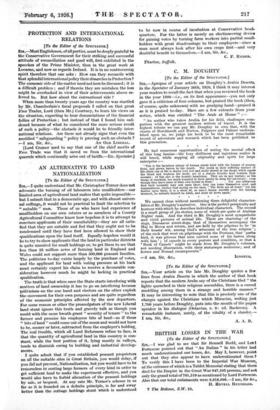AN ALTERNATIVE TO LAND NATIONALIZATION
[To the Editor of the SrEcrAxon.] Snz,—I quite understand, that Mr. Christopher Tumor does not advocate the turning of all labourers into smallholders—our limited area of agricultural land makes that quite impossible— but I submit that in a democratic age, and with almost univer- sal suffrage, it would not be practical to limit the selection to " suitable " men. Those of us who have had experience of smallholders on our own estates or as members of a County Agricultural Committee know how hopeless it is to attempt to convince applicants of their unsuitability—they are all satis- fied that they are suitable and feel that they ought not to be condemned until they have first been allowed to show their qualifications upon the land itself. Equally hopeless would it be to try to show applicants that the land in particular districts is quite unsuited for small holdings or, to get them to see that less than 26 million acres of farming land in England and Wales could not support more than 500,000 peasant families. The politician to-day exists largely by the purchase of votes, and the applicant for land with voting pressure at his back must certainly expect his claim to receive a favourable con- sideration however much he might be lacking in practical
qualification. •
The truth is that when once the State starts interfering with matters of -land ownership it has to go on interfering because igllitinians, on the one- hand and electors on the other exploit the•movement for their own purposes and are quite regardless of the economic principles affected by the new departure. For some reason or other the promulgators of the new Liberal land -stunt ignore this truth and gravely talk as though you could with the same breath grant " security of tenure " to the farmer and promise his employees bits of land—as if these " bits of land " could come out of the moon and would not have to be, sooner or later, subtracted from the employer's holding. The real trouble, which all Land Reformers refuse to face, is that the quantity of agricultural land in this country is con- stant, while the- best portion of it, lying mostly in valleys, tends to diminish owing to building and industrial develop- ments.
- I quite admit that if you established peasant proprietors on all the suitable sites in Great Britain, you would delay, -if you did not prevent, Nationalization, but you would have to be remorseless in ousting large farmers of every kind in order to get sufficient land to make the experiment effective, and you would also have to forbid alienation of the peasant holdings by sale, or bequest. At any rate Mr. Tumor's scheme in so far as it is founded on a definite principle, is far and away better than the cottage holdings stunt which is understood
to be now in course of incubation at Conservative head- quarters. For the latter is merely an electioneering device for gaining votes by turning farm workers into partial small- holders with great disadvantage to their employers—since a man must always look after his own crops first—and very doubtful benefit to themselves.—I am, Sir, &c., C. F. RYDER.
Thurlow, Suffolk.


























































 Previous page
Previous page